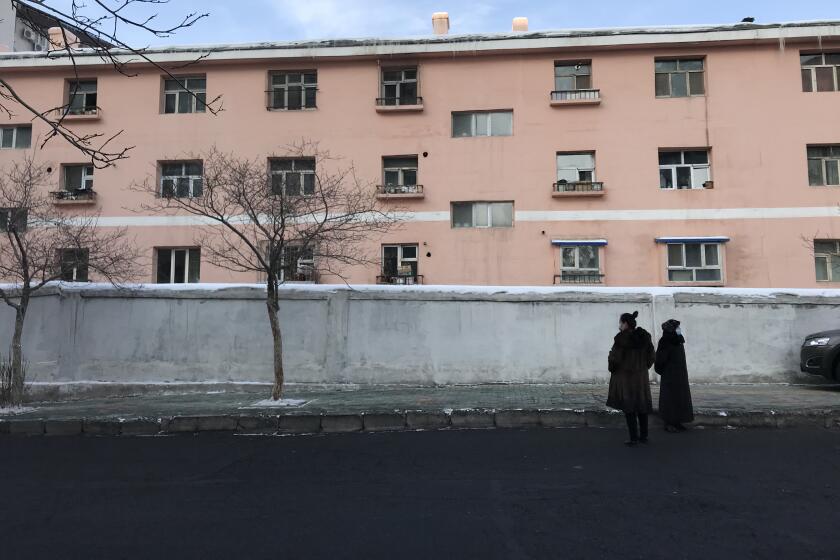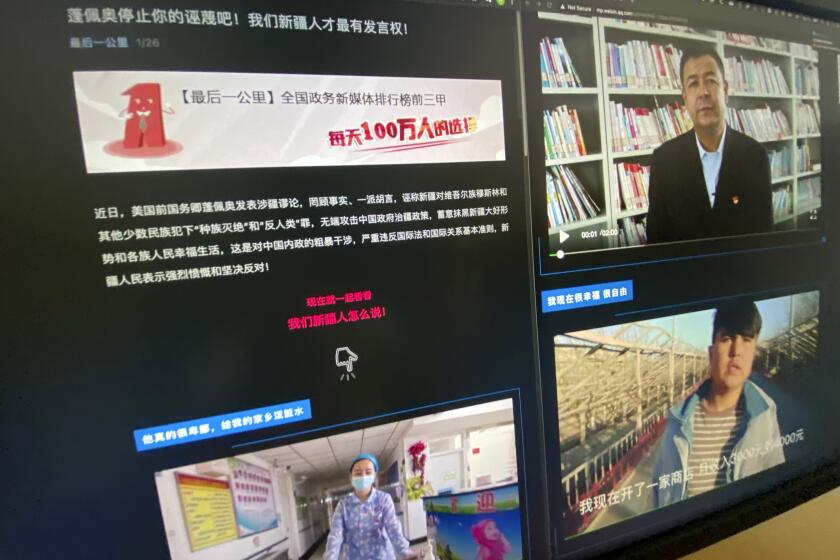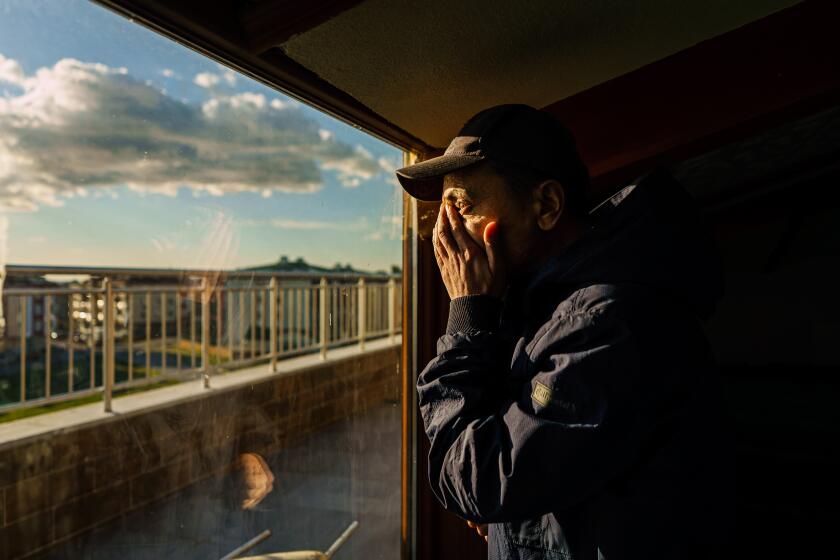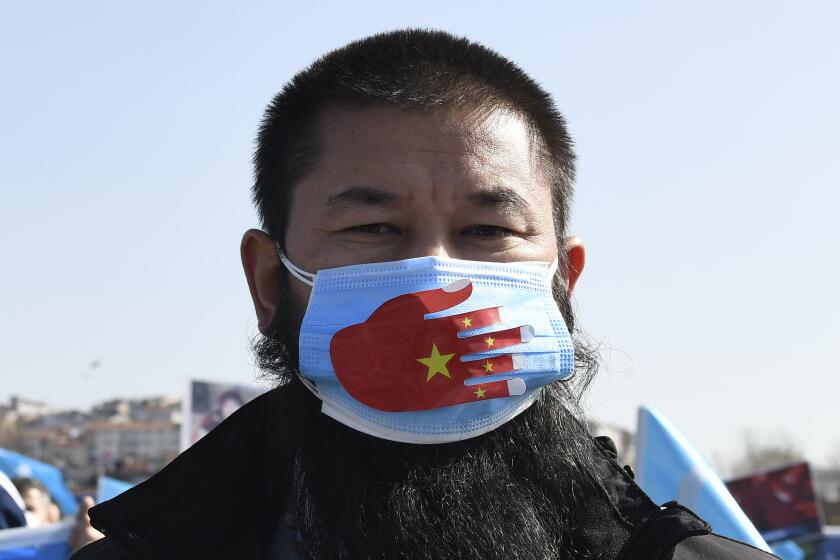Uyghur county in China has highest prison rate in the world
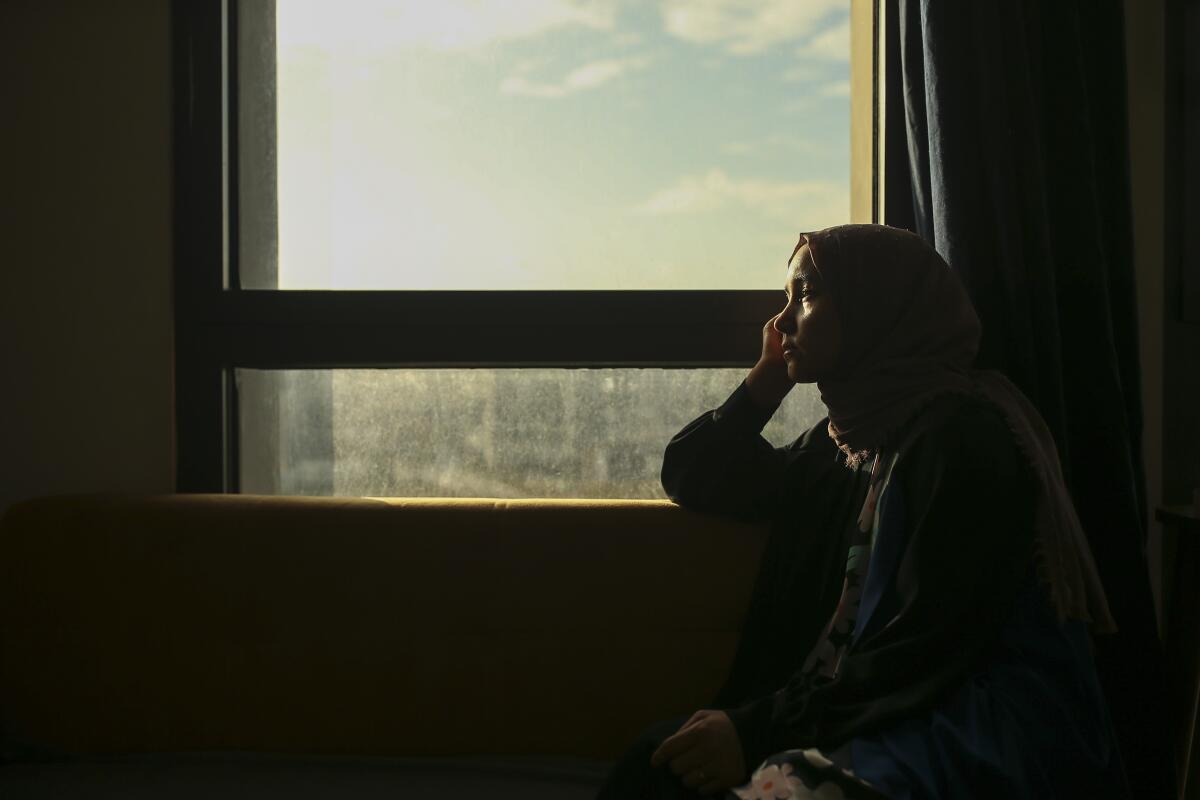
- Share via
BEIJING — Nearly 1 in 25 people in a county in the Uyghur heartland of China have been sentenced to prison on terrorism-related charges in what is the highest known imprisonment rate in the world, according to a review of leaked data.
A list obtained and partially verified by the Associated Press cites the names of more than 10,000 Uyghurs sent to prison in Konasheher county alone, one of dozens in southern Xinjiang.
In recent years, China has waged a brutal crackdown on the Uyghurs, a largely Muslim minority, which it has described as a war on terrorism.
The list is by far the biggest to emerge to date with the names of imprisoned Uyghurs, reflecting the sheer size of a Chinese government campaign that swept an estimated million or more people into internment camps and prisons in the western region.
It also confirms what families and rights groups have said for years: China is relying on a system of long-term incarceration to keep the Uyghurs in check, wielding the law as a weapon of repression.
Under searing international criticism, Chinese officials announced the closure in 2019 of short-term, extrajudicial internment camps where Uyghurs were detained without charges. However, although attention focused on the camps, thousands of Uyghurs still languish for years or even decades in prison on what experts say are trumped-up charges of terrorism.
Uyghur farmer Rozikari Tohti was known as a soft-spoken, family-loving man with three children and not the slightest interest in religion. So his cousin, Mihrigul Musa, was shocked to discover Tohti had been thrown into prison for five years for “religious extremism.”
“Never did I think he would be arrested,” said Musa, who now lives in exile in Norway. “If you saw him, you would feel the same way. He is so earnest.”
A vast system of Chinese surveillance, detention, cultural erasure and forced labor has devastated the Uighur people in Xinjiang, their homeland.
From the list, Musa found out Tohti’s younger brother, Ablikim Tohti, was sentenced to seven years on charges of “gathering the public to disturb social order.” Tohti’s next-door neighbor, a farmer called Nurmemet Dawut, was sentenced to 11 years on the same charges as well as “picking quarrels and provoking troubles.”
Konasheher county is typical of rural southern Xinjiang, and more than 267,000 people live there. The prison sentences across the county were for two to 25 years, with an average of nine years, the list shows. While the people on the list were mostly arrested in 2017, according to Uyghurs in exile, their sentences are so long that the vast majority would still be in prison.
Those swept up came from all walks of life and included men, women, young people and the elderly. They had only one thing in common: They were all Uyghurs.
Experts say it clearly shows people were targeted simply for being Uyghur — a conclusion denied by Chinese authorities. Xinjiang government spokesman Elijan Anayat said sentences were carried out in accordance with the law.
Videos of Uyghurs denying human rights abuses are part of a Chinese government campaign, but whether participation is voluntary is questionable.
“We will never specifically target specific regions, ethnic groups, religions, much less the Uyghurs,” Anayat said. “We will never wrong the good nor release the bad.”
The list was obtained by Xinjiang scholar Gene Bunin from an anonymous source who described themselves as members of China’s Han Chinese majority “opposed to the Chinese government’s policies in Xinjiang.”
It was passed to the Associated Press by an exiled Uyghur linguist in Norway. The AP authenticated it through interviews with eight Uyghurs who recognized 194 people on the list, as well as legal notices, recordings of phone calls with Chinese officials and checks of address, birthdays and identity numbers.
The list does not include people with typical criminal charges such as homicide or theft. Rather, it focuses on offenses related to terrorism, religious extremism or vague charges traditionally used against political dissidents, such as “picking quarrels and provoking troubles.” This means the true number of people imprisoned is almost certainly higher.
But even at a conservative estimate, Konasheher county’s imprisonment rate is more than 10 times higher than that of the United States, one of the world’s leading jailers, according to U.S. Department of Justice statistics. It’s also more than 30 times higher than for China as a whole, according to state statistics from 2013, the last time such figures were released.
Darren Byler, an expert on Xinjiang’s mass incarceration system, said most arrests were arbitrary and outside the law, with people detained for having relatives abroad or downloading certain cellphone applications.
Five years after China began the campaign of mass incarceration, cultural erasure and coercive labor, most Uyghurs abroad remain cut off from their families.
“It is really remarkable,” Byler said. “In no other location have we seen entire populations of people be described as terrorists or seen as terrorists.”
The crackdown kicked into high gear in 2017, after a string of knife attacks and bombings by a small number of Uyghur militants. The Chinese government defended the mass detentions as lawful and necessary to combat terrorism.
In 2019, Xinjiang officials declared the short-term detention camps closed, and said that all of whom they described as “trainees” had “graduated.” Visits by Associated Press journalists to four former camp sites confirm that they were shuttered or converted into other facilities.
But the prisons remain. Xinjiang went on a prison building spree in tandem with the crackdown, and even as the camps closed, the prisons expanded.
China is using the law “as a fig leaf of legality” in part
to try and deflect international criticism about holding Uyghurs, said Jeremy Daum, a criminal law expert at Yale University’s Paul Tsai China Center.
The Chinese government uses fear, division and propaganda to suppress discussion on Xinjiang, as it claims that all citizens support its policies.
The secretive nature of the charges against those imprisoned is a red flag, experts say. Although China makes legal records easily accessible otherwise, almost 90% of criminal records in Xinjiang are not public.
Abduweli Ayup, the Uyghur exile in Norway who passed the list to the AP, has closely documented the ongoing repression of his community. But this list in particular floored him. On it were neighbors, a cousin, a high school teacher.
“I had collapsed,” Ayup said. “I had told other people’s stories …. and now this is me telling my own story from my childhood.”
The widely admired teacher, Adil Tursun, was the only one in the high school in Toquzaq who could teach Uyghur students in Chinese. He was a Communist Party member, and every year his students had the best chemistry test scores in the town.
The names of Tursun and others on the list made no sense to Ayup because they were considered model Uyghurs.
“The names of the crimes, spreading extremist thoughts, separatism … these charges are absurd,” he said.
Kang reported from Beijing and Wu from Taipei, Taiwan.
More to Read
Sign up for Essential California
The most important California stories and recommendations in your inbox every morning.
You may occasionally receive promotional content from the Los Angeles Times.
